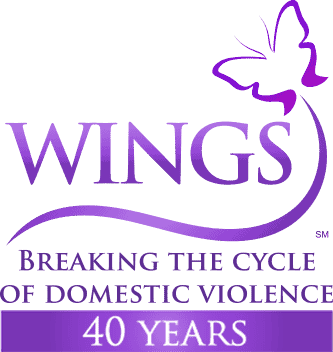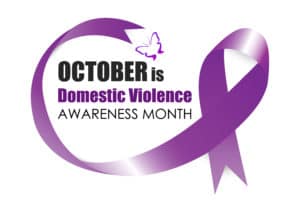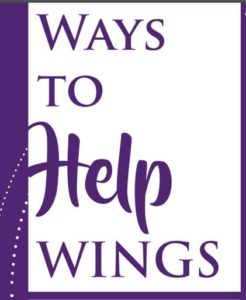October is Domestic Violence Awareness Month!
- Posted by Sarah Swiston
- On October 6, 2020
- chicago metropolitan area, COVID-19, Domestic Violence, domestic violence agency, DV agency, dv survivors, End Domestic Violence, non-profit, WINGS Program
When we think of domestic violence, often we picture physical abuse; however, there are many other ways abusers work to maintain power and control over their victim.
As October is Domestic Violence Awareness Month, WINGS will examine COVID-19 impacts and highlight a number of the types of abuse including Emotional, Financial, Spiritual and Stalking.
As the COVID-19 pandemic continues to challenge our community, the need to provide education and advocacy to end domestic violence is more important now than ever. The Illinois Domestic Violence Hotline saw a 70% increase in calls from the beginning of March to the end of April over the previous year.
Just like COVID-19, domestic violence does not discriminate and spreads throughout the world.
Throughout this pandemic, WINGS is caring for hundreds of people in secure locations across the Chicagoland area. With many victims socially isolating with their abusers, WINGS has been working to quickly move Safe House clients into stable housing to create openings. Thank you for your interest in learning more!
Emotional Abuse
“I wished I had known about WINGS sooner. I tried to ask my family for help, but they didn’t acknowledge the hurt I was going through.” – A WINGS Safe House client
Remember saying as a child, “Sticks and stones may break my bones, but words can never hurt me” to someone teasing you on the school playground? In essence, words can’t cause physical pain.
We know this isn’t true. In many ways, words cause even more pain, and often, for a longer time. Words, even the lack of words, are one of the most powerful tools for abusers to use against the abused.
Their words are meant to damage their partner’s self-esteem, making it easier for the abuser to wield power over them. Typical verbal abuse is name-calling, insulting remarks, shaming, put-downs and frequent criticism.
Economic/Financial Abuse
“…It has been about eight months now in WINGS Transitional Housing, and it has single-handedly opened the door to a lifestyle where the children and I are thriving. Since moving in, I went from working three different jobs to my one dream job…It’s like anything is possible, which is a full 180 from believing I was trapped and couldn’t do anything about it.” ~Samantha, a WINGS Program Participant
Economic/Financial Abuse is the number one reason someone will not leave or has to return to an abusive situation. 99% of all domestic violence cases involve economic/financial abuse.
Economic/Financial abuse occurs when one partner limits access to financial assets in order to control the other partner. An abuser may withhold money to make the abused financially dependent on them. Without access to financial resources, the victim’s options are severely restricted.
Add in COVID-19 and the variables attached to it (unemployment, underemployment, food insecurity, housing instability, etc.) and the number of abuse cases increases even more.
Females, who make up 94% of WINGS adult clients, have suffered disproportionately during the COVID-19 recession. The unemployment rate for women is the highest it has ever been since the Bureau of Labor Statistics began collecting gender data in 1948.
As several clients have lost their jobs and been furloughed during COVID-19, their rent has been waived, and WINGS Family Advocates have helped them file unemployment and receive assistance through grants to cover other bills and needs.
Spiritual/Religious Abuse
“In the dark, under a rock, beneath someone’s fist, I prayed to God to give me strength to find somewhere safe and free. I prayed and prayed, and this is what He gave me – You, WINGS, He gave me you. Your work, advocacy and generous hearts make me SO grateful! THANK YOU, I can’t say it enough!” -WINGS Transitional Housing Program Client
Spiritual/Religious abuse is the use of scriptures, traditions and cultural norms to assert power and control over an intimate partner. It is not limited to a certain religion or denomination. Any person, of any belief system, is capable of perpetrating spiritual/religious abuse.
Spiritual/Religious abuse includes:
- Uses spiritual/religious beliefs to manipulate or shame the person.
- Insults of one’s spiritual/religious beliefs.
- Uses religious texts or beliefs to minimize or rationalize abusive behaviors.
Stalking
“I had to move to another state, quit my job and leave my family and friends in order to be safe. Now, I’m starting new with nothing. He took everything from me. I’m scared.” – Mother of three children in WINGS Children and Family Services Program
Stalking is unwanted and/or repeated surveillance by an individual or group toward another person in which one party directs harassing or threatening behavior toward the intended target.
An alarming 19.3 million women and 5.1 million men in the United States have been stalked in their lifetime. Of that number, 61% of the women and 44 % of the men reported being stalked by a current or former intimate partner.
As many have been utilizing technology more than ever this year with the COVID-19 pandemic, it is pertinent to mention a sub-category of stalking that uses technology called cyberstalking. An abuser may use the internet or other electronic means to stalk or harass the victim. Ways cyberstalking happens are by:
- Contacting the victim by email, social media sites, a messaging app or through websites.
- Posting messages about the victim.
- Sharing personal information or pictures of the victim online to harass or scare them.
- Using technology to find/track the victim’s location.
What You Can Do
There are many ways you can bring healing, security and light to a survivor of domestic violence.
- Listen – let them know you are sorry this happened to them and are here to listen.
- Believe – validate their feelings by letting them know you believe them.
- Support – let them know you are a safe person to talk to and don’t put the blame on them.
- Connect – share WINGS Hotline at (847) 221-5680.
Click here to view ways you can make a difference by supporting WINGS mission to end domestic violence.
Interested in learning the latest WINGS news? Click here to sign up to receive email updates from WINGS.







0 Comments